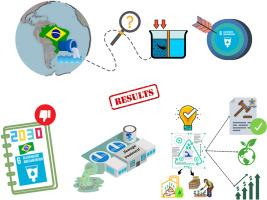Sewage waste management in Brazil: A sustainable development perspective
IF 4.4
3区 经济学
Q3 ENERGY & FUELS
引用次数: 0
Abstract
Achieving universal access to safe sanitation is a challenge that requires the integration of public policies, investment, technology, and efficient sewage waste treatment. This study examines sewage waste management in Brazil from a sustainable development perspective, assessing the availability of resources, actions, treatment types, disposal methods, treatment efficiency, and potential reuse opportunities. Historical data from 5570 Brazilian municipalities were compiled from key national sanitation databases. The analysis combines descriptive statistics, exploratory factor analysis, and qualitative assessments of the Sustainable Development Goal (SDG) 6 targets. The findings reveal that Brazilian sewage programs primarily emphasize population coverage while neglecting technical and qualitative aspects of sewage treatment. Water potability remains below SDG target 6.1, and if current investment patterns persist, Brazil will not meet target 6.2 by 2030, leaving only 42 % of the population with access to sewage services. Analysis of target 6.a highlights issues with insufficient local policies and limited financial investment. The development of the Sewage Treatment Index (STI) enabled a comprehensive assessment of treatment efficiency across all 5570 municipalities, highlighting areas for improvement and opportunities for sustainable practices. The results showed that only 33 % of municipalities met satisfactory sewage treatment efficiency (target 6.3). Although still in its early stages, incipient efforts toward sustainable sewage management are emerging through the regulated reuse of sewage waste in 1 % of municipalities, offering promising environmental, social, and economic potential benefits. However, the lack of regular census and sanitation survey data hinders transparent monitoring of progress toward SDG goals and national requirements. These findings raise questions about the accuracy of SDG 6 monitoring globally, suggesting that other countries may also be further from achieving the targets than current reports suggest.

巴西的污水废物管理:可持续发展的视角
实现普遍获得安全卫生设施是一项挑战,需要将公共政策、投资、技术和有效的污水处理结合起来。本研究从可持续发展的角度考察了巴西的污水废物管理,评估了资源的可用性、行动、处理类型、处置方法、处理效率和潜在的再利用机会。来自5570个巴西城市的历史数据是从主要的国家卫生数据库中汇编的。该分析结合了描述性统计、探索性因素分析和可持续发展目标6具体目标的定性评估。研究结果表明,巴西的污水处理项目主要强调人口覆盖率,而忽视了污水处理的技术和质量方面。饮用水仍然低于可持续发展目标6.1,如果目前的投资模式持续下去,到2030年,巴西将无法实现目标6.2,届时只有42%的人口能够获得污水处理服务。6.目标分析A突出了地方政策不足、财政投入有限的问题。污水处理指数(STI)的开发能够对所有5570个城市的处理效率进行全面评估,突出了需要改进的领域和可持续实践的机会。结果表明,只有33%的城市达到了令人满意的污水处理效率(目标6.3)。尽管仍处于早期阶段,但通过1%的城市对污水废物的规范再利用,可持续污水管理的初步努力正在出现,提供了有希望的环境,社会和经济潜在效益。然而,缺乏定期人口普查和卫生调查数据阻碍了对可持续发展目标和国家要求进展情况的透明监测。这些发现对全球可持续发展目标6监测的准确性提出了质疑,表明其他国家也可能比目前报告所显示的距离实现目标更远。
本文章由计算机程序翻译,如有差异,请以英文原文为准。
求助全文
约1分钟内获得全文
求助全文
来源期刊

Utilities Policy
ENERGY & FUELS-ENVIRONMENTAL SCIENCES
CiteScore
6.80
自引率
10.00%
发文量
94
审稿时长
66 days
期刊介绍:
Utilities Policy is deliberately international, interdisciplinary, and intersectoral. Articles address utility trends and issues in both developed and developing economies. Authors and reviewers come from various disciplines, including economics, political science, sociology, law, finance, accounting, management, and engineering. Areas of focus include the utility and network industries providing essential electricity, natural gas, water and wastewater, solid waste, communications, broadband, postal, and public transportation services.
Utilities Policy invites submissions that apply various quantitative and qualitative methods. Contributions are welcome from both established and emerging scholars as well as accomplished practitioners. Interdisciplinary, comparative, and applied works are encouraged. Submissions to the journal should have a clear focus on governance, performance, and/or analysis of public utilities with an aim toward informing the policymaking process and providing recommendations as appropriate. Relevant topics and issues include but are not limited to industry structures and ownership, market design and dynamics, economic development, resource planning, system modeling, accounting and finance, infrastructure investment, supply and demand efficiency, strategic management and productivity, network operations and integration, supply chains, adaptation and flexibility, service-quality standards, benchmarking and metrics, benefit-cost analysis, behavior and incentives, pricing and demand response, economic and environmental regulation, regulatory performance and impact, restructuring and deregulation, and policy institutions.
 求助内容:
求助内容: 应助结果提醒方式:
应助结果提醒方式:


